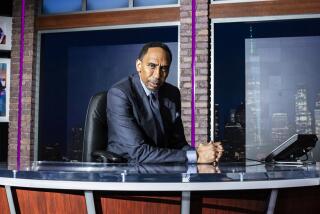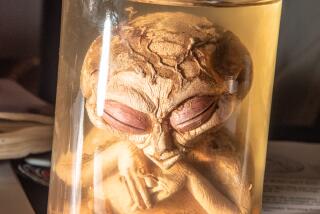A New Audience
- Share via
Scholar Huston Smith literally wrote the book on world religions. It can also be said that his life story reads as if it was lifted from the pages of his most enduring work.
Smith’s “The Religions of Man”--first published in 1958 when he was 38, and since reissued as “The World’s Religions”--is used in more introduction to religion courses than any other text. Translated into 14 languages, it has sold more than 1.5 million copies.
But Smith is no detached academic researcher. He’s a self-described mystic who has attempted to understand the world of religion from within. For Smith, all genuine religious expression points to the same transcendent truth.
“I stand with al-Ghazali [an 11th century Muslim mystic], who said the soul is a mosque for Muslims, a church for Christians, a temple for Hindus, an altar for Zoroastrians and a pasture for gazelles,” he said.
At 76, and still teaching part time at UC Berkeley, Smith is probably the world’s best-known scholar of religion. His genius is making the complex readily understandable. Still, he’s hardly a household name--but that may soon change.
Award-winning TV interviewer Bill Moyers is about to launch him into media orbit.
“The Wisdom of Faith With Huston Smith: A Bill Moyers Special” debuts on PBS nationwide next week but will begin on April 2 on KCET-TV Channel 28 in Los Angeles.
Moyers, in a separate interview, called Smith a visionary who has long sought to educate the public about the need in a pluralistic society to understand the religious beliefs of others--no matter how exotic they may appear.
The son of Methodist missionaries in China, Smith remained essentially a mainstream liberal Protestant--despite his growing interest in mysticism--until the late 1950s, when he became a professor of philosophy at the Massachusetts Institute of Technology.
In Boston, he became involved with a then-little-known Harvard University professor named Timothy Leary. Leary, as the world was soon to find out, was experimenting--legally at the time--with psychedelic drugs, and Smith became his consultant. His job was to compare drug-induced states of altered consciousness with the experiences described by mystics.
*
On New Year’s Day, 1961, Smith ingested LSD (“How else could I know what they were talking about?”). He concluded afterward that the experiences described by mystics throughout the ages were “descriptively indistinguishable” from the altered consciousness brought about by certain psychedelic drugs.
Moreover, the experience validated what he was already coming to believe about religion’s mystical core.
“It allowed me to experience directly what I previously had taken on faith,” he said, “which is that all things derive from an ultimate unity that is perfect in every respect, and that that perfection can be accessed and experienced.”
Some years later, Smith wrote a controversial article for the Journal of Philosophy in which he argued on behalf of the religious importance of consciousness-altering drugs. But he also wrote that while drugs can produce “religious experiences . . . it is less evident that they can produce religious lives.”
“The carry-over from a chemically induced mystical awareness is minimal because the experience takes place outside of a full religious context,” Smith explained recently. “Better to cultivate natural mystical experiences.”
However, even natural mystical experiences--defined by Smith as “altered states of reality in which only God seems to exist and all that exists is God”--fall short of religion’s ultimate purpose, he said.
“The purpose of religion is altered traits, not altered states,” Smith said. “It’s about how we live our lives.”
In 1970, Smith discovered Sufism--Islam’s mystical branch--and was taken with what he called its “depth of metaphysical penetration.” To his chagrin, he realized that the first edition of “The Religions of Man” made no mention of Sufism.
“That’s how ignorant I was of the mystical back in the ‘50s,” he said.
Today, Smith’s incorporation of Sufi practices--he prays five times daily in the Muslim manner--is an example of the degree to which his life mirrors his belief in the unity of spirit.
Smith insists that his first loyalty is to Christianity, even if he feels the need to “shore up” his faith by drawing upon the teachings and practices of other traditions “to satisfy my soul.”
“My body belongs to the faith into which I was born,” Smith said, “and I will be buried in it. But you’d have to label me a Confucian Methodist. My loyalty to the church is a kind of ancestor worship.”
Smith said that maintaining his connection to the Methodist church--he’s a regular at Sunday services--has also kept him from drifting into “cafeteria spirituality.”
“One needs the outward discipline and order of one faith,” he said. “But at the same time, it would be ridiculous to cage the spirit. It goes where it desires.”
Smith can also be highly critical of organized religion as it is expressed in contemporary America.
Despite his ongoing connection to Methodism, for example, he regards the mainline Christian churches of today as “washed-out theologically.”
Smith is equally critical of conservative Christians who seek to impose their beliefs on others. He is most upset at what he calls their intolerance.
“The conservatives are right to say that our spiritual life as a nation is unduly fettered by a misreading of the church-state separation clause,” he said. “But their expression of their beliefs, their protest, take forms that are quite ugly.”
(BEGIN TEXT OF INFOBOX / INFOGRAPHIC)
Smith to Discuss His Latest Book
Huston Smith will speak on the subject of his newest book--”The Triumph of the Native American Church”--at 11 a.m. on March 31 at the Philosophical Research Society, 3910 Los Feliz Blvd., Los Angeles. He will also lead a two-hour workshop starting at 2 p.m. the same day. The workshop fee is $15. (213) 663-2167.
More to Read
Sign up for our Book Club newsletter
Get the latest news, events and more from the Los Angeles Times Book Club, and help us get L.A. reading and talking.
You may occasionally receive promotional content from the Los Angeles Times.








